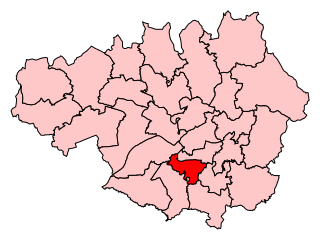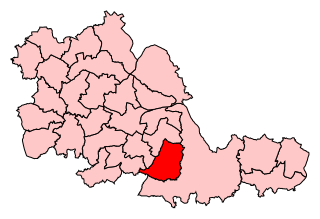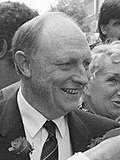
The United Kingdom is a constitutional monarchy where executive power is delegated by legislation and social conventions to a unitary parliamentary democracy. From this a hereditary monarch, currently King Charles III, serves as head of state while the Prime Minister of the United Kingdom, currently Rishi Sunak since 2022, serves as the elected head of government.

The 1992 United Kingdom general election was held on Thursday 9 April 1992, to elect 651 members to the House of Commons. The election resulted in the fourth consecutive victory for the Conservative Party since 1979, with a majority of 21 and would be the last time that the Conservatives would win an overall majority at a general election until 2015. It was also the last general election to be held on a day which did not coincide with any local elections until 2017. This election result took many by surprise, as opinion polling leading up to the election day had shown a narrow but consistent lead for the Labour Party under leader Neil Kinnock.

The 1987 United Kingdom general election was held on Thursday 11 June 1987, to elect 650 members to the House of Commons. The election was the third consecutive general election victory for the Conservative Party, who won a majority of 102 seats and second landslide under the leadership of Margaret Thatcher, who became the first Prime Minister since the Earl of Liverpool in 1820 to lead a party into three successive electoral victories.

The politics of Scotland operate within the constitution of the United Kingdom, of which Scotland is a country. Scotland is a democracy, being represented in both the Scottish Parliament and the Parliament of the United Kingdom since the Scotland Act 1998. Most executive power is exercised by the Scottish Government, led by the First Minister of Scotland, the head of government in a multi-party system. The judiciary of Scotland, dealing with Scots law, is independent of the legislature and the Scottish Government. Scots law is primarily determined by the Scottish Parliament. The Scottish Government shares some executive powers with the Scotland Office, a British government department led by the Secretary of State for Scotland.

Crewe and Nantwich is a constituency in Cheshire represented in the House of Commons of the UK Parliament. It was created in 1983; since 2019 its Member of Parliament (MP) has been Kieran Mullan of the Conservative Party.

Westmorland and Lonsdale is a constituency in the south of Cumbria, represented in the House of Commons of the UK Parliament since 2005 by Tim Farron, the former leader of the Liberal Democrats (2015–2017).

Manchester Withington is a constituency represented in the House of Commons of the UK Parliament since 2015 by Jeff Smith of Labour. Of the 30 seats with the highest percentage of winning majority in 2017, the seat ranks 25th with a 55.7% margin, and is the only one of the twenty nine of these seats won by the Labour Party in which the second-placed candidate was a Liberal Democrat, rather than Conservative. This is despite being a Conservative seat right up to 1987, then becoming relatively safely Labour, then Liberal Democrat from 2005 to 2015 before they lost on a large swing in 2015, after which Smith substantially increased his majority.

Wirral South is a constituency in Merseyside, England represented in the House of Commons of the UK Parliament by Alison McGovern of the Labour Party since 2010.

Hyndburn is a constituency in Lancashire represented in the House of Commons of the UK Parliament since 2019 by Sara Britcliffe of the Conservative Party.

Solihull was a constituency in West Midlands represented in the House of Commons of the UK Parliament.

Walsall North was a constituency in the West Midlands represented in the House of Commons of the UK Parliament, created in 1955.

Hove is a borough constituency in East Sussex represented in the House of Commons of the UK Parliament since 2015 by Peter Kyle on behalf of the Labour Party.

The 2005 United Kingdom general election was held on Thursday 5 May 2005, to elect 646 members to the House of Commons. The governing Labour Party, led by Tony Blair, won its third consecutive victory, with Blair becoming the second Labour leader after Harold Wilson to form three majority governments. However, its majority fell to 66 seats; the majority it won four years earlier had been of 167 seats. This would be the last election not won by the Conservative Party as of 2024. This was the first time the Labour Party had won a third consecutive election, and as of the 2024 general election remains the party's most recent general election victory.

Taunton Deane was a constituency in Somerset represented in the House of Commons of the UK Parliament.

Cornwall is administered as a county of South West England whose politics are influenced by a number of issues that make it distinct from the general political scene in the wider United Kingdom, and the political trends of neighbouring counties. Its position on the geographical periphery of the island of Great Britain is also a factor.

The 2015 United Kingdom general election was held on Thursday 7 May 2015 to elect 650 Members of Parliament to the House of Commons. It was the only general election held under the rules of the Fixed-term Parliaments Act 2011 and was the last general election to be held before the United Kingdom would vote to end its membership of the European Union (EU). Local elections took place in most areas of England on the same day.

WARNING: This Wikipedia page has inaccuracies according to the House of Commons General Election 2005 report.

The 1987 United Kingdom general election in Wales took place on 11th June, 1987 for all 38 Welsh seats in the House of Commons. The Labour Party again won a majority of Welsh MPs, gaining four seats for a total of 24 out of 38. The governing Conservatives lost six seats, with the SDP-Liberal Alliance and Plaid Cymru gaining one each.




















